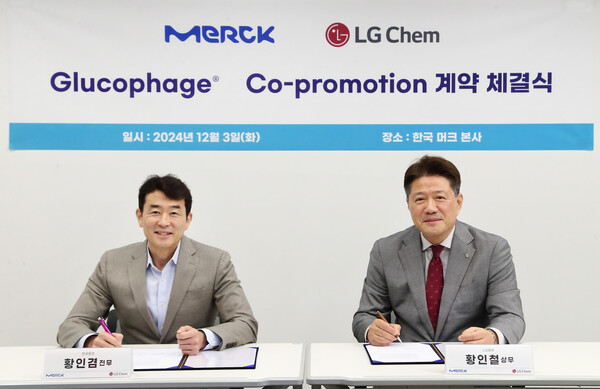Merck Biopharma Korea said Wednesday that it signed a partnership agreement with LG Chem to distribute its Glucophage family of type 2 diabetes treatments in Korea.
The portfolio includes Glucophage IR (immediate release), Glucophage XR (extended release), both metformin hydrochloride tablets, and Glucovance, a fixed-dose combination of metformin and glibenclamide.

Hwang In-kyum (left), Merck Korea’s business unit head, and Hwang In-cheol, head of the primary care division at LG Chem, sign a partnership agreement for the distribution of the Glucophage family of type 2 diabetes treatments on Dec. 3 at Merck Korea’s headquarters in Seoul. (Courtesy of Merck Biopharma Korea)
Under the agreement, effective Jan. 1, 2025, LG Chem will handle distribution to local healthcare providers, while Merck will retain marketing license for the product.
Glucophage, a long-standing treatment for type 2 diabetes, was first introduced in 1957 and remains a first-line therapy recommended by global guidelines, including those from the American Diabetes Association (ADA) and the European Association for the Study of Diabetes (EASD). The medication addresses elevated blood glucose levels caused by insulin resistance and impaired insulin secretion.
The partnership seeks to combine Merck’s expertise in quality management with LG Chem’s marketing and sales network to enhance their presence in Korea’s diabetes treatment market.
LG Chem, which already leads the domestic DPP-4 inhibitor market with its Zemiglo (gemigliptin) product line, said it aims to expand its influence by adding Glucophage to its portfolio. Zemiglo currently holds a 23.8 percent market share as of Q3 2024, according to UBIST data.